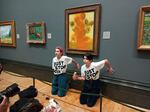
A handout photo issued by the group Just Stop Oil shows two protesters who threw soup at Vincent Van Gogh's famous 1888 work Sunflowers at the National Gallery in London on Friday.
Just Stop Oil / Just Stop Oil via AP
Updated October 14, 2022 at 12:46 PM ET
Climate protesters threw soup over Vincent van Gogh’s “Sunflowers” in London’s National Gallery on Friday to protest fossil fuel extraction, but caused no damage to the glass-covered painting.
The group Just Stop Oil, which wants the British government to halt new oil and gas projects, said activists dumped two cans of tomato soup over the oil painting, one of the Dutch artist's most iconic works. The two protesters also glued themselves to the gallery wall.
The soup splashed across the glass covering the painting and its gilded frame. The gallery said "there is some minor damage to the frame but the painting is unharmed." It was cleaned and returned to its place in the gallery on Friday afternoon.
The work is one of several versions of "Sunflowers" that Van Gogh painted in the late 1880s.
London's Metropolitan Police said officers arrested two people on suspicion of criminal damage and aggravated trespass.
"Specialist officers have now un-glued them and they have been taken into custody to a central London police station," the force said in a statement.
A group of protesters from the same group later gathered at police headquarters and sprayed yellow paint over the rotating "New Scotland Yard" sign in front of it. Several also glued themselves to the road, blocking traffic. Police said 24 people were arrested.
Just Stop Oil has drawn attention, and criticism, for targeting artworks in museums. In July, Just Stop Oil activists glued themselves to the frame of Leonardo da Vinci's "The Last Supper" at London's Royal Academy of Arts, and to John Constable's "The Hay Wain" in the National Gallery.
Activists have also blocked bridges and intersections across London during two weeks of protests.
The wave of demonstrations comes as the British government opens a new licensing round for North Sea oil and gas exploration, despite criticism from environmentalists and scientists who say the move undermines the country's commitment to fighting climate change.
Copyright 2022 NPR. To see more, visit https://www.npr.org.